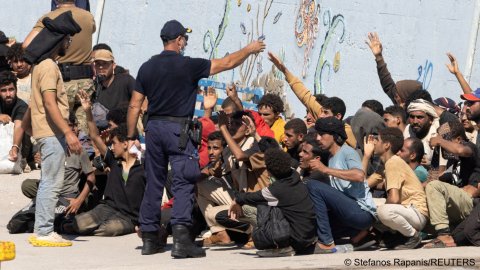EU Commissioner Seeks Enhanced Migration Controls in Libya
In light of the ongoing challenges surrounding migration in Europe, the EU Commissioner for Home Affairs recently visited Libya with a clear agenda: to strengthen migration controls. This visit highlights the European Union’s commitment to managing migration flows more effectively, while also addressing humanitarian concerns.
The Context of Migration in Libya
Libya has become a significant transit country for migrants attempting to reach Europe. Due to its strategic location, many individuals from various regions, including Africa and the Middle East, seek to cross the Mediterranean Sea in hopes of finding better opportunities in Europe. However, this journey is fraught with danger, and many migrants face dire situations, including human trafficking and exploitation.
The EU has recognized that enhancing cooperation with Libya is crucial for addressing these migration challenges. This collaboration aims to improve border security while ensuring the protection of migrants’ rights.
Key Objectives of the Visit
During the visit, the EU Commissioner emphasized several key objectives:
Partnerships with Libyan Authorities
The EU’s approach involves forging strong partnerships with Libyan authorities. This collaboration includes providing training, resources, and technical support to improve migration management. By working together, the EU and Libya can develop a more effective system for controlling migration flows.
Furthermore, the EU’s support is not solely about enforcement; it also encompasses initiatives aimed at improving the living conditions of migrants stranded in Libya. These efforts are crucial for ensuring that migrants are treated with dignity and respect, regardless of their immigration status.
Recent Developments in Immigration Policy
With the constantly evolving landscape of migration, recent news has highlighted various trends and policies affecting migrants:
Challenges Ahead
Despite efforts to enhance migration controls, significant challenges remain. The situation in Libya is complex, with political instability and ongoing conflict impacting the ability to implement effective migration policies. Furthermore, the humanitarian aspect cannot be overlooked, as many migrants face life-threatening conditions during their journey.
The EU’s commitment to enhancing migration controls must be balanced with a strong focus on human rights. Ensuring that migrants are treated fairly and provided with necessary support is essential for a sustainable approach.
Looking Forward
As the EU Commissioner continues to push for stronger migration controls in Libya, the outcome of these efforts will have lasting implications for migrants and the European Union’s overall migration strategy. By fostering collaboration and addressing the root causes of migration, the EU can work towards a more comprehensive and humane approach.
In conclusion, the visit underscores the EU’s determination to tackle migration challenges head-on while ensuring that humanitarian considerations are prioritized. As migration patterns evolve, ongoing dialogue and cooperation with countries like Libya will be essential for creating a safer and more secure migration environment.
In summary, improving migration controls in Libya is a multifaceted challenge that requires a collaborative approach. By focusing on both enforcement and humanitarian assistance, the EU and Libyan authorities can work together to address the complexities of migration effectively.










